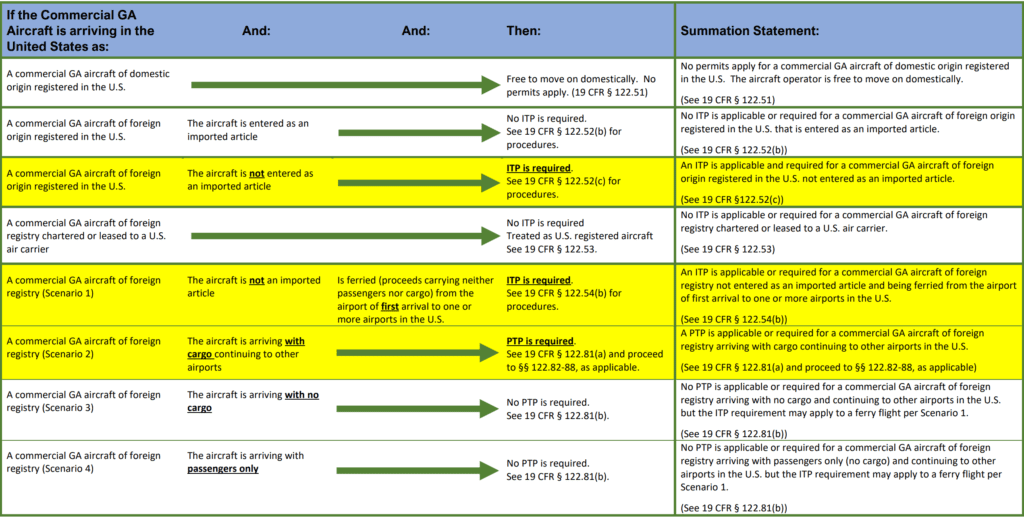U.S. CBP Provides Clarification on Permit to Proceed (P2P) Requirements

The business aviation industry received good news recently from United States Customs and Border Protection, regarding applicability and enforcement of Permit to Proceed for non-U.S-based charter operators.
After a cross-departmental review, CBP determined Permit-to-Proceed (P2P) regulations do not apply broadly to passenger operations as has been practice, but rather are specific to missions where CARGO is being carried.
Here’s everything you need to know.
How Permit-to-Proceed was historically applied
P2P is a legacy CBP regulation that requires certain non-U.S.-based aircraft gain approval from a CBP Port before continuing domestically to another. For decades, P2P requirements have been misunderstood often creating confusion, stress, hurdles, and potential delays for those non-U.S.-based charters.
Universal’s Global Regulatory Services works with CBP to clarify P2P requirements
Universal’s Global Regulatory Services team initiated talks with CBP HQ – GA Program Managers, and other industry stakeholders, to help gain clarity on the requirement and its intent. Universal shared examples of P2P’s inconsistency and the negative impact on affected operators.
CBP clarifies P2P requirements
After internal review with the GA National Team, CBP agreed the P2P regulation was not being appropriately managed. In response, CBP HQ provided written clarification to both industry at-large and internally with CBP Port personnel to confirm the original intent of P2P was for it to be required for non-U.S.-based charter operators carrying cargo, which is a much smaller percentage of overall charter ops.
Effective immediately, CBP has updated its P2P requirement language for these flights.
CBP Verbiage:
For a commercial aircraft of foreign registry arriving with cargo, under 19 CFR 122.81(a), Permit to Proceed is applicable and required.
Or
For a commercial aircraft of foreign registry arriving with no cargo, Under 19 CFR 122.81(b), a Permit to Proceed is not applicable or required.
| If the Commercial GA Aircraft is arriving in the United States as: | And: | And: | Then: | Summation Statement: |
| A commercial GA aircraft of foreign registry (Scenario 4) | The aircraft is arriving with passengers only | No PTP is required. See 19 CFR § 122.81(b). | No PTP is applicable or required for a commercial GA aircraft of foreign registry arriving with passengers only (no cargo) and continuing to other airports in the U.S. but the ITP requirement may apply to a ferry flight per Scenario 1.
(See 19 CFR § 122.81(b)) |
P2P Decision Tree
CBP also shared the following helpful decision tree:

When using the decision tree above, reference the following definitions the clearly spell out each type of aircraft.
- Private Aircraft – as defined in 19 CFR §122.1(h) Under 19 CFR §122.21, no permits for onward domestic movement apply and no bond requirements are required for private aircraft regardless of registry (foreign or domestic).
- Public Aircraft – as defined in 19 CFR §122.1(i) Under 19 CFR §122.1 (i) and 19 CFR §122.21, no permits for onward domestic movement apply and no bond requirements are required for public aircraft regardless of registry (foreign or domestic).
- Commercial Aircraft – as defined in 19 CFR §122.1(d) Under 19 CFR Subparts F and I, certain permits for onward domestic movement and bond requirements may apply to arriving General Aviation commercial aircraft. The two types of onward domestic permit processes are known as International Traffic Permits (ITP) and Permits to Proceed (PTP). Below is a decision-table – in its current form – to help you work through all 6 General Aviation Commercial Aircraft scenarios where permits may apply.
Conclusion
This is a nice win for business aviation and good example of the value our Global Regulatory Services team brings to your missions – both in expertise and what they can accomplish leveraging their strong relationships with gov’t agencies like U.S. CBP, CBSA, EASA, eu-LISA, and many others.




